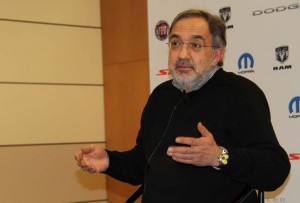Analysts and potential investors who’ve been waiting for a Chrysler stock offering are going to have to keep waiting – possible for quite some time, the maker’s CEO is cautioning.
After Italian automaker Fiat effectively took control of the U.S. maker following its 2009 bankruptcy, Sergio Marchionne signaled he would stage an Initial Public Offering in relatively short order. The IPO has since been pushed back repeatedly by Marchionne – CEO of both Fiat and Chrysler.
In a Detroit radio interview, the Canadian-educated executive this week said he will not authorize the stock offering until the time is right. In fact, he told an Italian newspaper last month, that Chrysler just might skip the IPO entirely.
“It’s not imminent,” Marchionne told Detroit talk station WJR when asked about when Chrysler might take itself public again.
That’s not a particular surprise to many industry observers considering the poor reception automotive stocks have gotten in recent months. While it has bounced back from the lows of late 2011, Ford Motor Co. has been trading in the $12 range this week, well below its $16.18 52-week high. As for General Motors, it has been slowly clawing back last ground, but at around $25 this morning, it is well below the $33 strike price set at its own November 2010 IPO.
It is, of course, possible that the resurgent economy, rebounding U.S. automotive market and the general surge in stock prices could provide impetus to Chrysler – and to GM, which is also waiting to sell off the one-third stake in the company still held by the federal government.
But it is also possible Marchionne might skip taking Chrysler public altogether.
Fiat has steadily increased its holdings since receiving 20% of Chrysler after the bankruptcy. It now holds 58.5% – and has advised government regulators it is interested in pushing that to 70% or more by acquiring some of the shares now held by the United Auto Workers Union’s so-called VEBA health care trust.
Marchionne last month told Italy’s Corriere della Sera newspaper that one option would be to buy out the VEBA shares entirely. Or he could formally merge Fiat and Chrysler in a way that effectively dilutes the union’s remaining shares. One way or the other, the UAW is expected to eventually want to cash out.
But an IPO is not off the table, Marchionne said during his radio interview – a transcript of which has been published by Chrysler.
“We have now created a corporate governance system that’s effectively capable of handling a public U.S. listed company,” he stressed.
A continued upturn in the stock market could force Marchionne’s hand.
Separately, Chrysler revealed in its annual report that the CEO received neither salary nor stock awards last year. But he did get $4.5 million in salary and other fees from Fiat. In 2010, the American side of the trans-Atlantic alliance awarded Marchionne $600,000 in stock awards.
Two Chrysler executives received more than $1 million in compensation in 2011 – requiring government approval as part of the maker’s federal bailout. Richard Palmer, Chrysler’s senior vice president and chief financial officer, earned $1.18 million in salary, stock and stock options, while General Counsel Holly Leese’s compensation came to $1.15 million.

